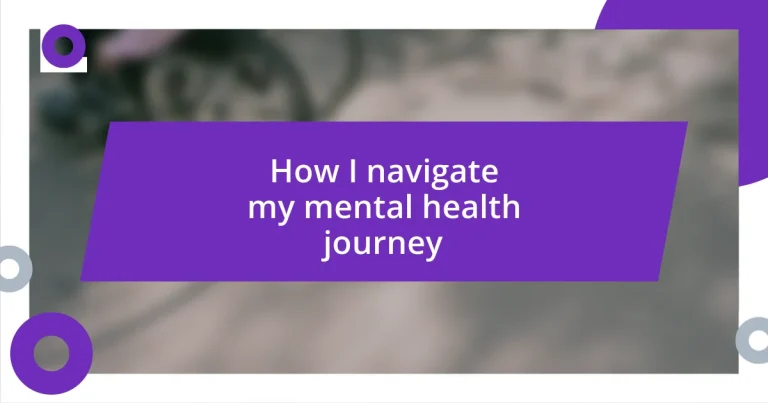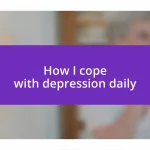Key takeaways:
- Mental health encompasses emotional, psychological, and social well-being, emphasizing the importance of acknowledging feelings and challenges to reclaim wellness.
- Developing coping strategies, such as deep breathing, physical activity, and journaling, plays a crucial role in managing stress and enhancing emotional resilience.
- Building a support system and seeking professional help are vital components in the journey toward better mental health, offering valuable tools and perspectives to navigate challenges.
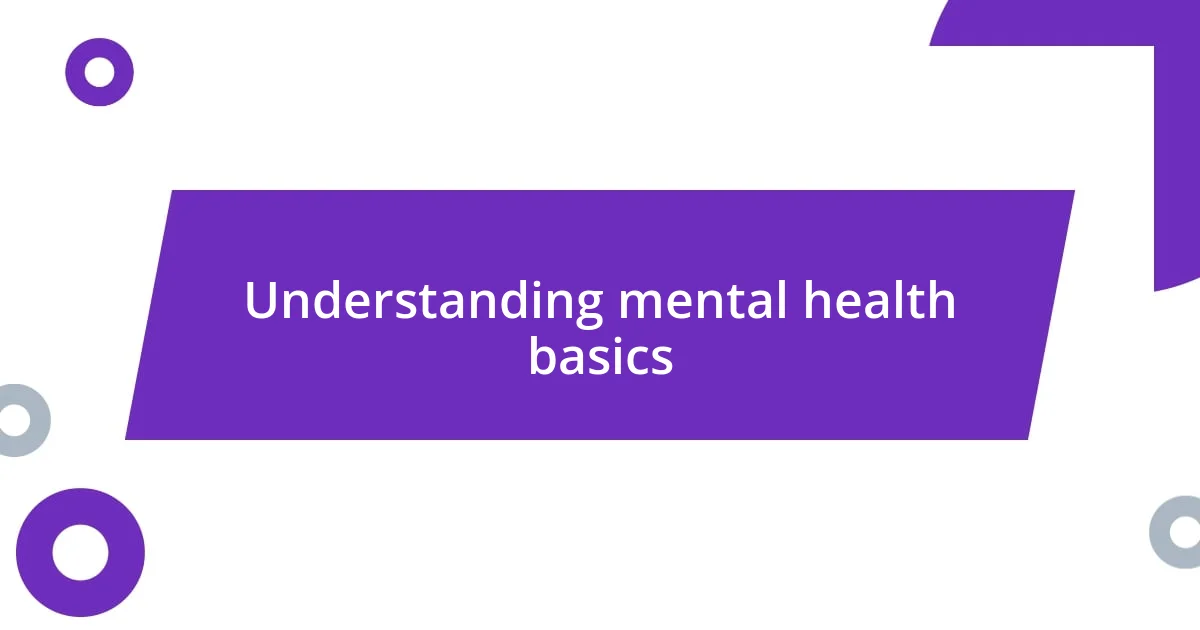
Understanding mental health basics
Mental health is often misunderstood, yet it encompasses much more than just the absence of mental illness. I remember when I first realized that mental health is like a home—sometimes, it’s sturdy, but other times, it may need repairs. Isn’t that something we can all relate to at times in our lives?
One fundamental aspect of mental health is the balance between our emotional, psychological, and social well-being. I’ve experienced moments when stress can throw this balance off, making even simple tasks feel like climbing a mountain. How often do we ignore our feelings until they bubble over unexpectedly?
Understanding the basics means acknowledging that mental health affects how we think, feel, and act. Think about a time when you felt overwhelmed; perhaps you even snapped at a loved one. It’s crucial to recognize these feelings—not as weaknesses but rather as signals indicating that we need to check in with ourselves. Wouldn’t you agree that understanding these emotions can be empowering?

Identifying personal mental health challenges
Identifying personal mental health challenges can often feel like staring into a mirror—sometimes difficult and uncomfortable, but necessary. I recall a particularly challenging period in my life when I felt persistently low; it took several sleepless nights for me to realize that what I was grappling with was more than just stress. The signs were subtle at first, but as I tuned in more closely, the clarity became undeniable.
Here are some ways I’ve identified my personal challenges:
- Emotional changes: I noticed mood swings or moments of irritability creeping into my everyday life.
- Physical symptoms: Unexplained fatigue or headaches sometimes signaled deeper emotional turmoil.
- Social withdrawal: I began to withdraw from friends and family, preferring solitude over connection.
- Coping mechanisms: I recognized that my reliance on unhealthy habits—like binge-watching TV instead of engaging in hobbies—was a signal of my struggles.
- Persistent thoughts: Recurrent negative thoughts started to dominate my mind, hinting that I needed to seek help.
Being aware of these signs allowed me to initiate a conversation with myself about my mental wellness, making those dark clouds feel a little less daunting. Wouldn’t you say that acknowledging our challenges is the first step in reclaiming our well-being?
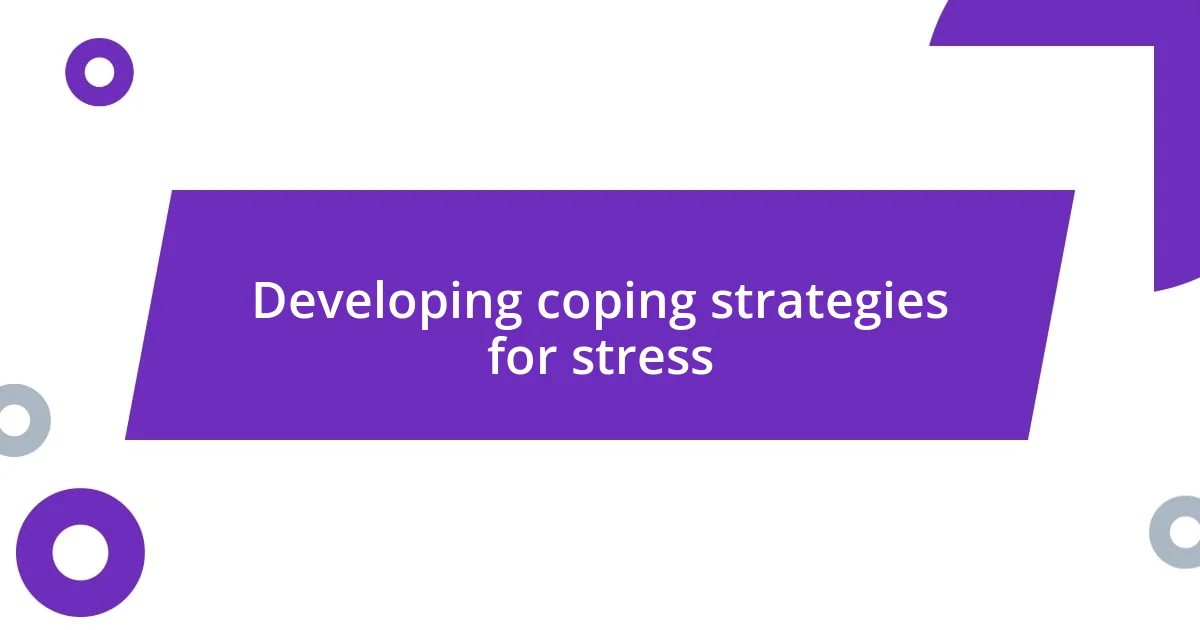
Developing coping strategies for stress
Developing effective coping strategies for stress can feel like building a toolkit for life’s unexpected challenges. I’ve often found that simple practices, when done regularly, can serve as vital stress relievers. One of my go-to strategies is deep breathing exercises; just a few minutes of focused breathing can shift my mindset dramatically. Have you ever tried tuning into your breath during a stressful moment?
Engagement in physical activities has also been transformative for me. Whether it’s a brisk walk in nature or an intense workout session, moving my body helps release pent-up energy and clears my mind. I remember one instance when I was feeling particularly overwhelmed, and just stepping outside for a run helped put everything into perspective. It’s fascinating how physical movement can reframe our thoughts, isn’t it?
Journaling is another technique I cherish. Reflecting on my day or jotting down worries allows me to externalize stressors, making them feel manageable. I once dedicated a few minutes each night to express gratitude in my journal, which not only lightened my emotional load but also shifted my focus towards positivity. Isn’t it interesting how putting pen to paper can spark newfound clarity?
| Coping Strategy | Benefits |
|---|---|
| Deep Breathing | Reduces anxiety and promotes relaxation. |
| Physical Activity | Releases tension and enhances mood through endorphins. |
| Journaling | Helps organize thoughts and fosters gratitude. |
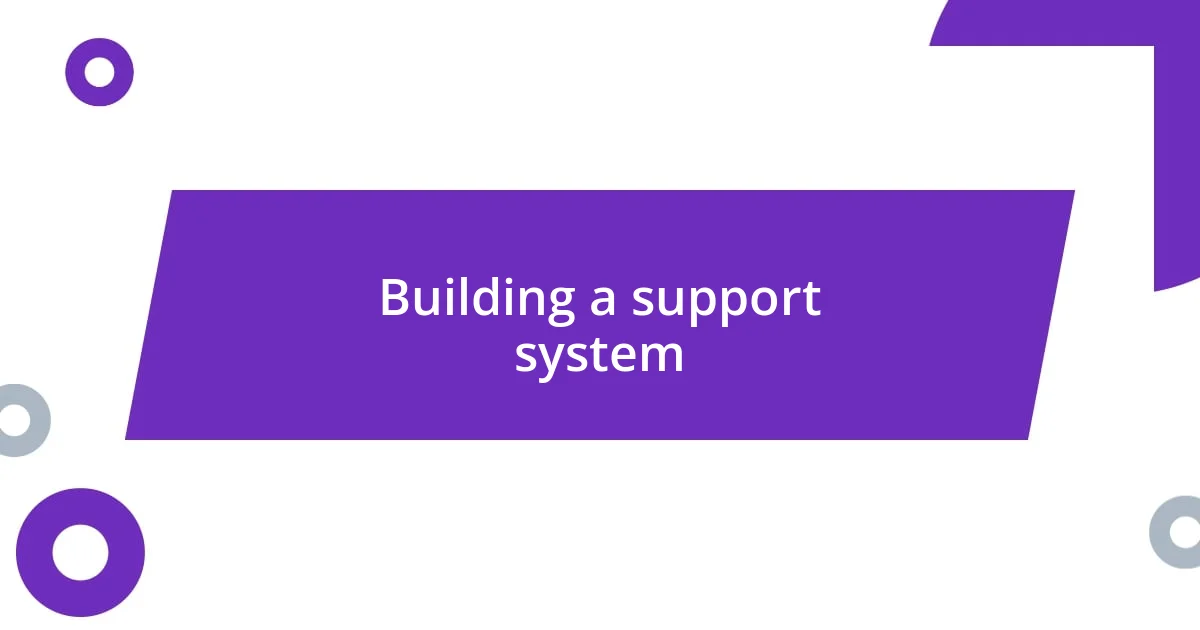
Building a support system
Building a support system has been one of the most transformative aspects of my mental health journey. I vividly remember the day I reached out to a close friend after bottling up my feelings for far too long. Their understanding and non-judgmental response made me realize just how vital it is to have people around who are willing to listen. Don’t you think that sometimes, simply having someone to lean on can lighten the emotional load?
I’ve also learned that support comes in various forms. Beyond friends and family, community groups and online forums can provide a sense of belonging that I didn’t know I needed. For instance, I joined a local mental wellness group where sharing experiences felt liberating. Seeing others voice similar struggles validated my feelings. Isn’t it amazing how connecting with strangers can create bonds that feel tightly knit, like family?
Establishing boundaries within these relationships is crucial too. I’ve had to figure out when to engage and when to step back, ensuring that my connections nourish rather than drain me. Remembering to communicate openly about my needs has empowered my relationships, allowing me to build a network that supports me. Wouldn’t you agree that a healthy support system can make all the difference on this journey?
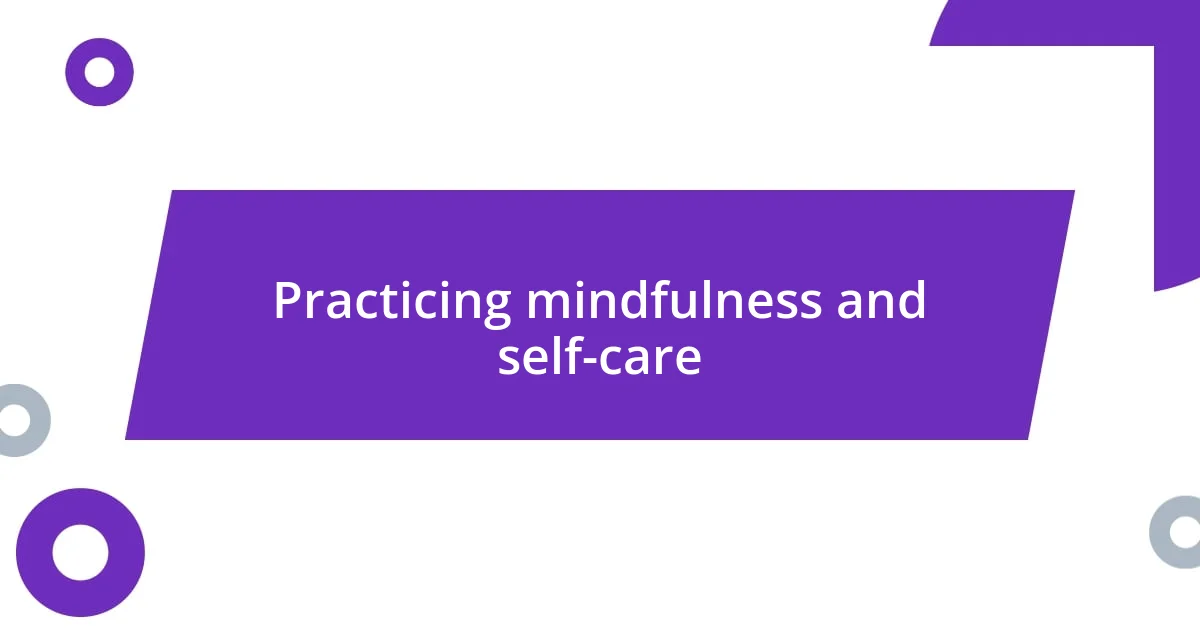
Practicing mindfulness and self-care
Practicing mindfulness has truly been a game-changer for me. I often find myself pausing during the day to just soak in my surroundings, whether it’s the scent of my morning coffee or the vibrant colors of flowers in my garden. This simple act of being present helps me connect with my feelings in a deeper way. Have you ever paused to really feel the moment around you, instead of rushing through it?
Self-care, on the other hand, has become a vital part of my routine. I remember a time when I felt completely burned out, juggling too many responsibilities. Implementing self-care rituals, like enjoying a long bath or indulging in a favorite book, became essential. It’s remarkable how prioritizing those small moments of joy can replenish my emotional reserves. Do you take time for yourself, even in the busiest days?
On particularly challenging days, I engage in guided meditation, allowing my mind to drift and quiet itself. The first time I tried it, I was surprised at how much clarity emerged from just ten quiet minutes. This practice has taught me that it’s okay to take a step back and breathe, and that sometimes, the best way to navigate stress is to simply be still. How do you typically find calm amidst the chaos?
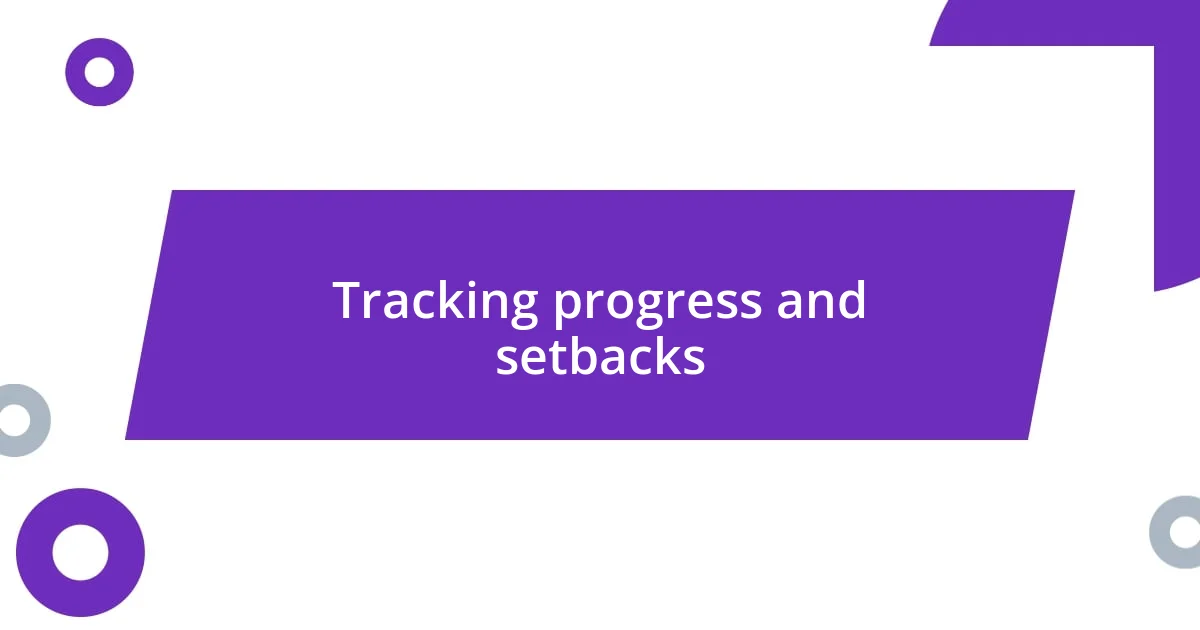
Tracking progress and setbacks
Tracking my progress and setbacks in my mental health journey has proven to be an illuminating experience. I began keeping a journal, which felt a bit daunting at first. But as I wrote down my feelings, I noticed patterns emerging, and this clarity helped me celebrate small victories. Have you ever been surprised by how much you’ve grown simply by reflecting on your own thoughts?
There have been days when I felt like I was taking two steps forward and then one step back. One particular week stands out—I remember feeling incredibly hopeful after a therapy session, only to face an unexpected wave of anxiety soon after. It was disheartening, but recognizing that setbacks are a part of the journey made me more resilient. It’s like climbing a mountain: sometimes you stumble, but each foothold gets you closer to the summit. Don’t you think it’s important to view these challenges as opportunities to learn?
I also started using apps to track my mood and thoughts, which transformed my perspective. On days when everything feels overwhelming, reviewing my past logs reminds me that I’ve overcome difficult moments before. This practice not only provides insight into what triggers my emotions but also inspires me to keep moving forward. How often do we forget how far we’ve come until we take a moment to look back?

Seeking professional help when needed
Seeking professional help has often made a significant difference in my mental health journey. I vividly remember the first time I sought therapy; I was hesitant and unsure. Yet, sitting in that cozy office, I felt a weight lift off my shoulders simply by voicing my feelings. Have you ever experienced the relief that comes from sharing your thoughts with someone who understands?
In moments of overwhelming stress, I’ve learned that a therapist can provide valuable tools and perspectives. For instance, after discussing my anxiety triggers in a session, my therapist guided me to develop a grounding exercise. Implementing that tool during tough times allowed me to regain a sense of control. It’s amazing how a professional can illuminate paths we may not see on our own, don’t you think?
I also appreciate that seeking help is not a sign of weakness; rather, it’s a courageous step toward wellness. The stigma around mental health can feel daunting, but breaking that barrier is empowering. When I decided to consult a psychiatrist about my struggles, I was surprised by the profound sense of support I felt. Have you considered how seeking professional help could shift your perspective and improve your mental well-being?












